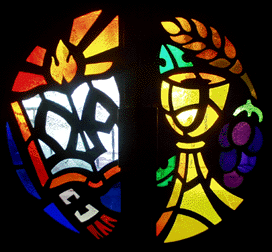The Spirit’s Presence in Word and Sacrament
Guest
 By Hannah Coyne
By Hannah Coyne
One of the reasons I am drawn to Anglicanism—that I stick with Anglicanism—is because I am a lover of words and symbols. Our liturgy is full of both, and I can testify to the Holy Spirit’s presence in both. Although I did not understand the full meaning of the liturgy or sacraments as a child, I do know that without explicit instruction, at the age of three I vehemently made known to my mom that I was ready to take communion. Though I had not attended the required First Communion classes, I insisted at the altar rail one Sunday morning that it was time to partake in the elements. I was done with the substitute of the priest’s blessing (the priest was also my dad) and ready for the real thing. My mom quietly asked me if I knew what the bread and wine symbolized. “The body and blood of Jesus Christ!” I yelled. My mom let me take communion. This experience was a grace in my young life, and speaks to one of the ways we trust the Holy Spirit works—consciously and unconsciously—through word and sacrament in the Anglican mode of worship.
My favorite set of words in the Book of Common Prayer occurs in the baptismal liturgy. Right before the newly baptized is presented to the congregation, the priest marks their forehead with the sign of the cross while saying, “You are sealed by the Holy Spirit in Baptism and marked as Christ’s own for ever.” These words were spoken over me at 11 days old, and I’ve been trying to figure them out ever since. These words assure me of the Word’s presence in my life, made known to me through his Holy Spirit. “Christ’s own”—loving me before I was even aware of it. “Christ’s own”— speaking through me as a toddler lucky enough to grow up in a Christian home. “Christ’s own”—bought with a price, redeemed, sanctified, justified, made holy, able to experience shalom—there are too many scriptural references to cite and too much theology to delve into there. “Marked”—chosen, set apart, called, protected. “Sealed by the Holy Spirit”—achieved not through human effort but by the Lord and giver of life, the Holy Spirit. “For ever” —even if when I don’t feel it, even when I don’t deserve it, even when I do the things I do not wish to do. You are sealed by the Holy Spirit in Baptism and marked as Christ’s own for ever. Those 16 words pack a punch.
I studied linguistics in college, and one of the first things I learned is that words are merely symbols. Potentially powerful symbols, yes, but symbols nonetheless. Words only achieve meaning from the real things they are attached to. “Butterfly” means nothing to you until you have seen a monarch beating its wings with your own eyes. Like words, the sacraments of baptism and communion are symbols, too. The catechism explains that the sacraments are outward and visible signs (read: symbols) of inward and spiritual grace. This grace must be experienced, not just cogitated about or announced over us in the sacraments. And grace, such as the grace of knowing you are marked as Christ’s own for ever, is delivered through the Holy Spirit.
Perhaps this is the nexus of our Anglican spirituality: Without the Spirit, word and sacrament remain mere symbols, and without word and sacrament, the Spirit remains a slippery abstraction. I give thanks for the earthiness of sound waves, which we hear as words, and for water, bread and wine, which we call sacraments. They all point me towards the concrete earthiness of our faith: an incarnate Word, a loving Father and the grace of the sent Spirit.
Hannah Coyne is native of western Massachusetts and obtained her Master’s in Pastoral Theology from Regent College in Vancouver.










